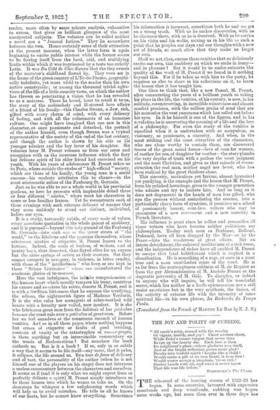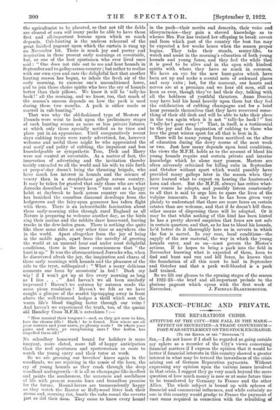THE JOY AND POLITY OF CUBBING.
"All earth's astir, roused with the revelry Of vigour, health, and joy ! Cheer awakes cheer, While Echo's mimic tongue that never tires Keeps up the hearty din. Each face is then Its neighbour's glass—where gladness sees itself, And at the bright reflection grows more glad ! Breaks into tenfold mirth ! laughs like a child ! Would make a gift of its own heart, it is so free ! Would scarce accept a kingdom, 'tis so rich ! Shakes hands with all, and vows it never knew That life was life before."
SO/IFERVILE'S The Chase.
THErehearsal of the hunting season of 1922-23 has begun. In some countries, favoured with expansive moorlands and deep woodlands, tubbing was begun some weeks ago, but more than ever in these days has the agriculturist to be placated, so that not till the fields are cleared of corn will many packs be able to have those first and all-important lessons upon which so much depends. Cub-hunting is the undress rehearsal of the great finished pageant upon which the curtain is rung up . on November 1st. There is much joy and poetry and inspiration in these present early mornings at covertside, but, as one of the best sportsmen who ever lived once said : " One does not ride out to see and hear hounds in September and to gallop across country ; but rather to realize with our own eyes and ears the delightful fact that another hunting season has begun, to inhale the fresh air of the early morning, to exercise one's unconditioned horse, and to join those choice spirits who love the cry of hounds better than their pillows. We know it will be ' tally-ho back !' all the morning, and we know, too, that much of the season's success depends on how the pack is used during these two months. A pack is either made or marred in cub-hunting."
That was why the old-fashioned type of Masters of Hounds were wont to look upon the preliminary stages of each hunting season as more or less private fixtures, at which only those specially notified as to time and place put in an appearance. Until comparatively recent days cubbing trysts were rarely advertised, for, however welcome and useful those might be who appreciated the real motif and polity of cubbing, the impatient and less knowledgeable or sympathetic Tom, Dick and Harry were not wanted at covertside. As a matter of fact, the innovation of advertising and the invitation thereby tacitly extended to all the world and his wife to ride forth at peep-o'-day doesn't bring the thrusting brigade, who have much less interest in hounds and the science of venery than in a steeplechase gallop across country. It may be taken for granted that only those who are what Jorrocks described as werry keen " turn out as a happy habit at daybreak to hack across country ere the sun has banished the countless diamond dewdrops from the hedgerows and the fairy-spun gossamer has taken flight with them. There is an indescribable fascination about these early-morning rides through rural England as all Nature is preparing to welcome another day, as the birds sing their matins and the rabbits draw homeward, leaving tracks in the dew-laden grass. There is nothing else quite like these same rides at any other time or anywhere else in the world. Apart altogether from the joy of being in the saddle again, apart from the novelty of greeting the world at an unusual hour and under most delightful conditions, there is the inner consciousness that the hunt is up." It was the aforementioned Jorrocks who, when he discovered afresh the joy, the inspiration and charm of these early mornings with hounds and the pleasures of the ride to the tryst, soliloquized : " What a many delicious moments one loses by smooterin' in bed ! Dash my wig ! if I won't get up at five every morning as long as I live . . . ' , And haven't we all been similarly impressed ? Haven't we autumn by autumn made the same pious resolution ? Haven't we felt as we have caught a glimpse of the scarlet tip-tupping away in front above the well-trimmed hedges a thrill which sent the warm life's blood tingling faster through our veins ? And haven't we experienced the truth, too, of the quaint old- Handley Cross M.F.H.'s catechism ? :— " How musical their tongues !—and, as they get near to him, how tho chorus fills ! Hark ! he is found. Now where are all your sorrows and your cares, ye gloomy souls ? Or where your pains and aches, ye complaining ones ? One hollow has dispelled them all I " No schoolboy homeward bound for holidays is more buoyant, more elated, more full of happy anticipation than the real sportsman and sportswoman en route to watch the young entry and their tutor at work.
So we are greening our breeches' knees again in the woodlands, we are rejoicing in the music of the horn, the cry of young hounds as they crash through the deep woodland undergrowth—it is all so champagne-like in effect and paints the sombreness, the sameness and sordidness of life with present roseate hues and boundless promise for the future. Hound-lovers are transcendently happy as they watch the Ranter or Rallywood litter lash their sterns and, scorning riot, bustle the cubs round the coverts just as did their dam. They come to know every hound in the pack—their merits and demerits, their voice and idiosyncrasies—they gain a shrewd knowledge as to whence Mrs. Fox has trained her offspring to break covert and from which part of the country the best fun may be expected a few weeks hence when the season proper begins. They take their stands, sentry-like, to watch and assist in the morning's education of both young hounds and young foxes, and they feel the while that it is good to be alive and in the open with kindred spirits with whom they have so much in common. We have an eye for the new hunt-gates which have been set up and make a mental note of awkward places and easy emits ; but, for the moment, our hearts and nerves are at a premium and we hear old men, still as keen as ever, though they've had their day, talking with all the boldness of youthful thrusters. Anno Domini may have laid his hand heavily upon them but they feel the exhilaration of cubbing champagne and for a brief hour persuade themselves that they have recovered some- thing of their old dash and will be able to take their place in the van again when it is not " tally-ho back 1 ' but " tally-ho ! gone away ! " That, in itself, is a testimonial to the joy and the inspiration of cubbing to those who love the great winter sport for all that is best in it. There will be many young foxes sacrificed on the altar of education during the dewy morns of the next week or two. Just how many depends upon local conditions, the views the M.F.H. holds as to the amount of blood his young hounds require and certain private and interior knowledge which he alone may possess. Masters are often adversely criticized for killing cubs in September and October without sport which would possibly have provided many gallops later in the season when they have learned what to expect on hearing the huntsman's horn and cheer. But the M.P.H. always has critics what- ever course he adopts, and possibly listens courteously to all that is said to urge him to spare the lives of the vulpine innocents. It may be he has been given very plainly to understand that there are more foxes on certain estates than are welcome, and that if he doesn't kill them. other means of dispersing them will be adopted. Or it may be that whilst nothing of this kind has been hinted he has a pretty shrewd suspicion that foxes are not safe in certain quarters, and that, as he has to blood his hounds, he'd better do it thoroughly here as in coverts in which the fox is sacred. In any case, local conditions—the supply of the raw material, the way in which the young hounds enter, and so on—must govern the Master's actions. If he hopes to bring a pack into the field in November knowing what is expected of them, keen to find and hunt and run and kill foxes, he knows that the foundation of all this must be laid in September and October and that a pack well-blooded is a pack half trained.
So we lift our glasses to the opening stages of the season. of 1922-23—the brief and all-important prelude to the glorious pageant which opens with the first week of November. J. FAIRFAX-BLAICEBOROUGH.



































 Previous page
Previous page